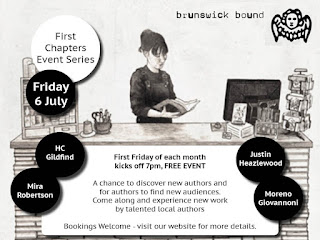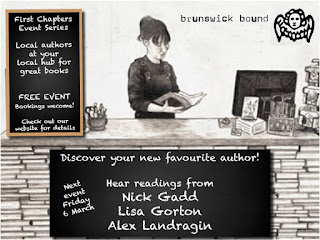First Chapters Q&A with Enza Gandolfo
Enza Gandolfo is a Melbourne-based writer and an honorary professor in Creative Writing at Victoria University. She is also the co-editor of the journal TEXT and a founding member of the Victoria University Feminist Research Network.
Enza's first novel, Swimming (2009), was shortlisted for the Barbara Jefferis Award.
She will be reading from her new novel The Bridge at First Chapters on Friday 5 October.
1.
Brunswick Bound has asked you to read a chapter from your published work.
Tell us what we can expect from the chapter you have chosen?
I
am going to read the Prologue of The Bridge. This introduces the reader to Antonello, one of the two main protagonists,
and to the West Gate bridge. We get a sense of the relationship between
Antonello and the bridge, as well as between Antonello and his wife, Paolina.
The prologue is set in October 1970, a couple of days before the bridge
collapses and Antonello’s life is changed forever.
2.
How would you describe the kind of books that you write?
The Bridge is my second novel. My first
novel, Swimming was published in
2009. They are very different novels but they do have some common elements:
they are both set in the western suburbs of Melbourne, and they both explore
the way that people deal with loss and grief, and with the unexpected events
that can throw life off course. My writing
(short fiction, memoirs and novels) is motivated by a desire to tell the stories
of those people whose lives are often invisible or silenced in the mainstream
culture – in particular women, migrants and the working class. My aim is to
write stories that challenge and broaden our ideas about who we are as
Australians and as global citizens, stories that help us build empathy and
understanding for each other.
In
Swimming, I am exploring what it
means to be a woman without children in a world that equates womanhood with
motherhood. Kate is 60, she is looking back at her life, and the way it has
been shaped by her struggles with infertility. It is also about her
relationship with her best friend and her best friend’s daughter, it is about
creativity, betrayal and ocean swimming. With The Bridge, I wanted to write about the working class, and to tell the story of the West Gate Bridge
collapse, a story that is not only integral to Melbourne’s history, but to the
history of the modern city. While it explores an actual event, The Bridge is a novel and a novel is
always about the characters, in this case, two young people whose lives, and
the lives of their families and friends, are changed due to tragic events; it is
about culpability and guilt, about love and the possibility of redemption.
I
was born into a house with no books. My family were Sicilian migrants and they
did not read English, and Italian books were hard to come by in the 50s in
Australia. However, it was a house overflowing with stories. My grandmother especially
loved to tell me stories, most of these were set in the small village in the
Sicilian hills where she came from. In her stories, there were magical elements
– babies that tamed snakes, spirits that promised treasures in return for favours.
In her telling, these were as real and as ordinary as cooking and washing, as
talking to neighbours or cleaning after the animals. They left an impression
because they transported me to a place that my family called home, but I had
never been, and because in those stories anything was possible.
Once I started to read, I devoured books and so there are
many that left an impression. One is a little-known book called, A Bunch of Ratbags by William Dick. I
read it when I was in Grade 5. It left an impression because it was set in
Footscray. I had never read a book set in my suburb before. I loved seeing my
neighbourhood through the eyes of the narrator. It also inspired me as a
writer, the idea that I could tell the stories of the people I knew.
4.
Do you believe that books should answer life’s big questions?
The
best novels ask the big questions and then explore them through the lives of
individual characters. There are no definitive answers to these questions, but
through reading, we gain insights which we can take back into our own lives. My
writing always begins with questions I don’t know the answers too, I write to
explore those questions.
5.
What’s your go-to solution for writer’s block?
Writing.
Keep writing. Even if what is coming out initially is not great or not even on
topic. One of the things I learnt from being an academic and writing lectures
and papers to a deadline, is that you can work through writer’s block if you
stay with the work, push through it. This works with all kinds of writing
including fiction. Often when I have
writer’s block it’s because I have reached a difficult point in the story – a
dark or emotional scene – and I am reluctant to go there, or reluctant to take
my characters there, but the only way forward is to push through. Of course,
there are times when its best to have a break, in those times I find going for a
swim or a walk and letting my mind drift into a kind of dream space helps.
6. What is your favourite word or phrase?
One of my mother-in-law’s sayings is a favourite of mine – fare un buco nell’acqua which translates
to ‘making a hole in water’. Perfect saying when you have to cut the paragraph
you spent all day writing.
7.
What do you put down as your occupation when asked?
Until
recently ‘academic and writer’ and now ‘writer’.
8.
What is the question that you hope never to be asked in an author Q&A?
Nothing
comes to mind. I love being asked new questions, challenging questions I
haven’t been asked before.
9.
What question do you hope you will be asked and why?
I
love it when interviewers and readers ask questions that are surprising and
that I haven’t thought of myself. Often
readers see things in a novel that the writer doesn’t see, each person brings
their own life and their own experiences to a novel and it makes the work
richer. I look forward to the surprising
questions.
10.
Which book that you have read do you think should be better known or more
widely read?
Rosa
Cappiello’s Oh Lucky Country was
published in 1984. She was an Italian migrant living in Australia. She wrote
the novel in Italian and then it was translated into English. This is a
passionate, angry and often confronting novel about alienation. Unlike other
novels classified in the ‘migrant writing’ genre, there is no grateful migrant or
‘migrant as victim’ here. The protagonist, Rosa is a sharp and critical
observer of Australia and Australians. She
explores a number of issues: gender and class as well as ethnicity. The
language is playful and the text is experimental. It is often left off the list
of Australian classics, but I think it’s an important Australian novel, that
still has much to say about identity and nationhood and the way we see
ourselves as Australians.
You can find out more about First Chapters on the Brunswick Bound website. Bookings via Eventbrite.





Comments
Post a Comment